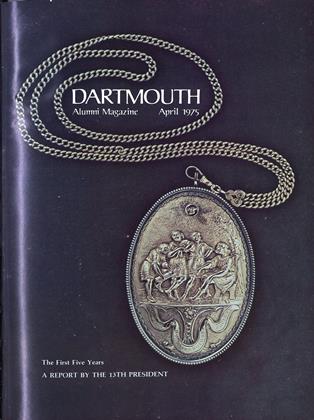FOR 25 years - from 1929 to 1954 - as Class Secretary I faced the monthly requirement of meeting the ALUMNI MAGAZINE'S deadline for Class Notes copy. And now, after 20 years of surcease, here I am again - though in another role. Still, as different as the roles of Class Secretary and Trustee may be in context, they are totally alike in their common purpose of service to the College. And though each performs his services in quite different areas and under vastly different burdens of responsibility, the goal of each is to support and nourish the purposes and achievements of the College. So, I am pleased to find myself in such good company once more.
There are so many things about being a Dartmouth Trustee that are of great interest and concern that it is difficult to choose a topic for this short piece. But it seems to me that there is one matter that is of sufficient common interest to justify the choice. The first time I was confronted formally by the question of Trustee accessibility and accountability was at one of meetings of the Dartmouth Campus Conference, an organization set up by the Board of Trustees on the recommendation of President Dickey in the late 1960s to provide a forum for current campus issues. Its membership consisted of four undergraduates, four faculty members, the dean of the College, the dean of the faculty, the President of the College, an alumnus, and two Trustees. The conference met in two-day "retreat" sessions three times a year. During its active years I was chairman.
At one of the early meetings the discussion centered on whether the membership of the Board of Trustees should be broadened to include representatives of the faculty and of the undergraduates. Although the first day's session heard arguments favoring the proposal, at the close of the second day the unanimous conclusion was that faculty and undergraduate representation on the Board would not work. The principal reason was that a Dartmouth Trustee has no constituency other than the College. Accordingly, a member of the faculty or an undergraduate on becoming a Trustee would perforce be disqualified from representing his intended constituency. But that did not end the matter. What also came out of the debate was unanimous agreement that both the faculty and the undergraduates wanted and were entitled to be heard - accessibility of the Trustees - and to be kept informed - accountability of the Trustees. 1 believe that conclusion remains the considered judgment of those who have been concerned with the issue.
But Trustee accessibility and accountability are not solely in the interests of the faculty and the students. They are quite as essential to the College's relationships with the third major constituency - the alumni - who are often ranked "primus inter pares." And as the Trustees make their way toward the desired accessibility and accountability, they must do so within each of these three major relationships.
Fortunately, there exists within the alumni body an organization, the Alumni Council, which affords the Trustees the opportunity and means to demonstrate and accomplish accessibility and accountability. Although this means has not yet been used very effectively, steps are now being taken to make the most of this readily available resource for exchanging views toward better mutual understanding and the greater unity of the College.
It may seem as strange to others as it has to me that these questions of the relationships of the Dartmouth Trustees have been raised only recently in the burgeoning course of the College's development throughout this century. But as the problems facing the Trustees have multiplied and intensified, especially during these past ten or more years of rapid change, anxieties have begun to trouble those whose loyalties and commitments to the welfare of Dartmouth so rightly entitle them to be ranked as the body, the heart, and the very spirit of the College. So, as seldom before, at least in this century, there is need to find ways to encourage and experience the full exchange of views and concerns that spring from a shared awareness and understanding of the various attitudes and the aspirations that bear upon the very course of the College. This, I believe, we shall do.
The trusts that a Trustee of Dartmouth undertakes are manifold. Perhaps the most important one may be to acknowledge and be ever mindful of the very magnitude of the College; the fullness of the place; to recognize and revere the historical contributions of this College — its eminence. The Trustee must never become lost in the intensity of current problems, severe as they may be, overwhelming as they may seem to be, for in the continuum of the College they may turn out to be but passing concerns. Rather, he must be the custodian of the College's past as well as Trustee of its present and its future. What the Trustees in their collective judgment determine will not only fix the course of the future but will either preserve and enrich or impair and enfeeble the historic College and the particular qualities that have nourished the College's deep purposes and high aspirations and have endowed it with its goodness and its grace, its valor and its strength — those very attributes that have exalted the spirit of the place and the spirit of all Dartmouth's sons.
Mr. Andres became chairman of the Board of Trustees in 1972.
F. WILLIAM ANDRES '29
Article
-
 Article
ArticleRESIGNATION OF PRESIDENT NICHOLS
December, 1915 -
 Article
ArticleNEW DORMITORY NAMED GILE HALL
DECEMBER 1927 -
 Article
ArticleSummer Term Opens
August 1944 -
 Article
ArticleHawaii
October 1959 By COMDR. ARM IN E W. LAUGHTON '31 -
 Article
ArticleTuck School
April 1948 By H. L. DUNCOMBE JR. -
 Article
ArticleThe Admissions Problem Grows With Every Mail
February 1946 By Robert C. Strong '24












